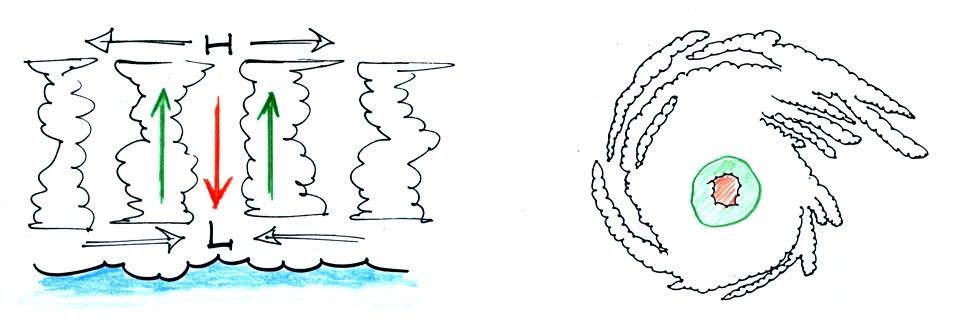Tropical Cyclones
form in the subtropics (5 to 20 latitude) over warm oceans
plenty of warm water at the
equator but no Coriolis force
plenty of Coriolis force at higher latitude but ocean
water
is too cool
Trade winds cause hurricanes to move from East to West
Called hurricanes, typhoons, cyclones in different parts of the world
Hurricane season in the N. Atlantic is from June 1 - Nov. 30
peak activity in August -
October
A meteorological process of some kind causes surface winds to converge
Convergence causes rising air
motions.
In an unstable atmosphere a cluster of thunderstorms forms
Hurricanes have a warm core

Low pressure at bottom center of a hurricane
surface winds converge and
spin: CCW in NH, CW in SH
record low sea level pressure values have all been set in
hurricanes
High pressure at the top center of a hurricane
upper level winds diverge
this can lower the sea level pressure and cause the storm
to
intensify
Key features
eye - sinking air causes
clear skies
eye wall - strong thunderstorms in a ring around the eye
Stages of development
tropical
disturbance
tropical depression
tropical storm - storm gets a name
1953 - late 1970s given
female names only
now alternately given male and female names
restart at the beginning of the alphabet every year
hurricane - winds must be 75 MPH or greater
Saffir Simpson scale
1 (weak) to 5 (strongest)
storm surge
rise in ocean levels when
hurricane comes on shore
2005 was a record setting year
record number of named storms
(27 beat the old record of 21)
ran out of names, had to use
greek character names
Wilma was the most intense N. Atlantic hurricane ever
Rita and Katrina also made
the Top 10 list
Katrina was the 3rd most intense Atlantic hurricane to hit the US
mainland
The 1935 Labor Day storm and
Camille are still #1 and #2, Andrew is #4
Katrina became (easily) the most costly natural disaster in US history
The 1900 Galveston hurricane remains the deadliest natural disaster in
US history
None of the 2005 hurricanes
made the Deadliest Atlantic Hurricanes list
